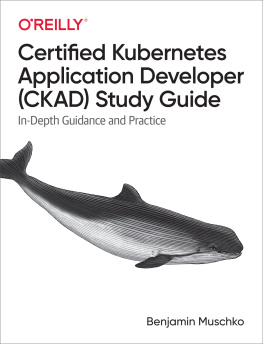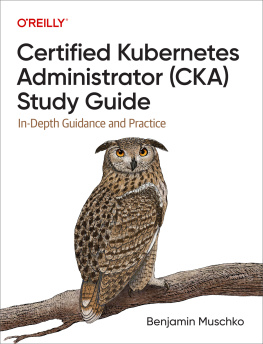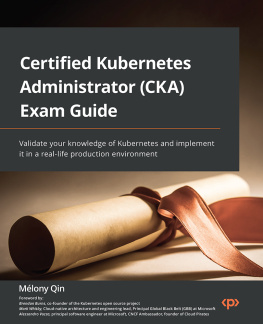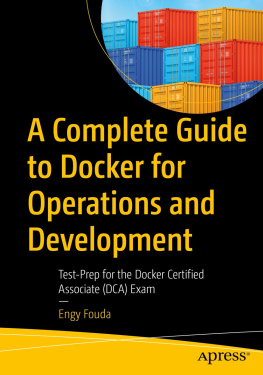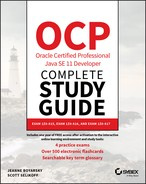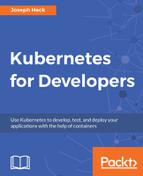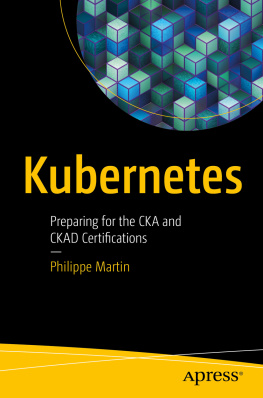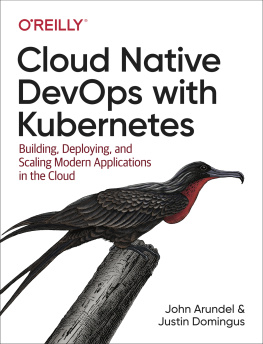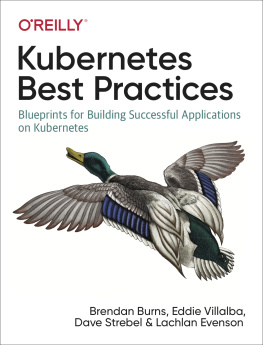Certified Kubernetes Application Developer (CKAD) Study Guide
by Benjamin Muschko
Copyright 2021 Automated Ascent, LLC. All rights reserved.
Printed in the United States of America.
Published by OReilly Media, Inc., 1005 Gravenstein Highway North, Sebastopol, CA 95472.
OReilly books may be purchased for educational, business, or sales promotional use. Online editions are also available for most titles (http://oreilly.com). For more information, contact our corporate/institutional sales department: 800-998-9938 or corporate@oreilly.com .
- Acquisitions Editor: John Devins
- Development Editor: Michele Cronin
- Production Editor: Beth Kelly
- Copyeditor: Holly Bauer Forsyth
- Proofreader: Justin Billing
- Indexer: Judy McConville
- Interior Designer: David Futato
- Cover Designer: Karen Montgomery
- Illustrator: Kate Dullea
- February 2021: First Edition
Revision History for the First Edition
- 2021-02-02: First Release
See http://oreilly.com/catalog/errata.csp?isbn=9781492083733 for release details.
The OReilly logo is a registered trademark of OReilly Media, Inc. Certified Kubernetes Application Developer (CKAD) Study Guide, the cover image, and related trade dress are trademarks of OReilly Media, Inc.
The views expressed in this work are those of the author, and do not represent the publishers views. While the publisher and the author have used good faith efforts to ensure that the information and instructions contained in this work are accurate, the publisher and the author disclaim all responsibility for errors or omissions, including without limitation responsibility for damages resulting from the use of or reliance on this work. Use of the information and instructions contained in this work is at your own risk. If any code samples or other technology this work contains or describes is subject to open source licenses or the intellectual property rights of others, it is your responsibility to ensure that your use thereof complies with such licenses and/or rights.
978-1-492-08373-3
[LSI]
Preface
Microservices architecture is one of the hottest areas of application development today, particularly for cloud-based, enterprise-scale applications. The benefits of building applications using small, single-purpose services are well documented. But managing what can sometimes be enormous numbers of containerized services is no easy task and requires the addition of an orchestrator to keep it all together. Kubernetes is among the most popular and broadly used tools for this job, so its no surprise that the ability to use, troubleshoot, and monitor Kubernetes as an application developer is in high demand. To help job seekers and employers have a standard means to demonstrate and evaluate proficiency in developing with a Kubernetes environment, the Cloud Native Computing Foundation (CNCF) developed the Certified Kubernetes Application Developer (CKAD) program. To achieve this certification, you need to pass an exam.
The CKAD is not to be confused with the Certified Kubernetes Administrator (CKA). While there is an overlap of topics, the CKA focuses mostly on Kubernetes cluster adminstration tasks rather than developing applications operated in a cluster.
In this study guide, I will explore the topics covered in the CKAD exam to fully prepare you to pass the certification exam. Well look at determining when and how you should apply the core concepts of Kubernetes to manage an application. Well also examine the kubectl command-line tool, a mainstay of the Kubernetes engineer. I will also offer tips to help you better prepare for the exam and share my personal experience with getting ready for all aspects of it.
The CKAD is different from the typical multiple-choice format of other certifications. Its completely performance based and requires you to demonstrate deep knowledge of the tasks at hand under immense time pressure. Are you ready to pass the test on the first go?
Who This Book Is For
The primary target group for this book is developers who want to prepare for the CKAD exam. The content covers all aspects of the exam curriculum, though basic knowledge of the Kubernetes architecture and its concepts is expected. If you are completely new to Kubernetes, I recommend reading Kubernetes Up & Running by Brendan Burns, Joe Beda, and Kelsey Hightower (OReilly) or Kubernetes in Action by Marko Luka (Manning Publications) first.
What You Will Learn
The content of the book condenses the most important aspects relevant to the CKAD exam. Given the plethora of configuration options available in Kubernetes, its almost impossible to cover all use cases and scenarios without duplicating the official documentation. Test takers are encouraged to reference the Kubernetes documentation as the go-to compendium for broader exposure.
The outline of the book follows the CKAD curriculum to a tee. While there might be a more natural, didactical structure for learning Kubernetes in general, the curriculum outline will help test takers with preparing for the exam by focusing on specific topics. As a result, you will find yourself cross-referencing other chapters of the book depending on your existing knowledge level.
Be aware that this book only covers the concepts relevant to the CKAD exam. Certain primitives that you may expect to be covered by the certification curriculumfor example, the API primitive Ingressare not discussed. Refer to the Kubernetes documentation or other books if you want to dive deeper.
Practical experience with Kubernetes is key to passing the exam. Each chapter contains a section named Sample Exercises with practice questions. Solutions to those questions can be found in the .
Conventions Used in This Book
The following typographical conventions are used in this book:
ItalicIndicates new terms, URLs, email addresses, filenames, and file extensions.
Constant widthUsed for program listings, as well as within paragraphs to refer to program elements such as variable or function names, databases, data types, environment variables, statements, and keywords.
Constant width boldShows commands or other text that should be typed literally by the user.
Constant width italicShows text that should be replaced with user-supplied values or by values determined by context.
Tip
This element signifies a tip or suggestion.
Note
This element signifies a general note.
Warning
This element indicates a warning or caution.
Using Code Examples
The source code for all examples and exercises in this book is available on GitHub. The repository is distributed under the Apache License 2.0. The code is free to use in commercial and open source projects. If you encounter an issue in the source code or if you have a question, open an issue in the GitHub issue tracker. Ill be happy to have a conversation and fix any issues that might arise.
This book is here to help you get your job done. In general, if example code is offered with this book, you may use it in your programs and documentation. You do not need to contact us for permission unless youre reproducing a significant portion of the code. For example, writing a program that uses several chunks of code from this book does not require permission. Selling or distributing examples from OReilly books does require permission. Answering a question by citing this book and quoting example code does not require permission. Incorporating a significant amount of example code from this book into your products documentation does require permission.

